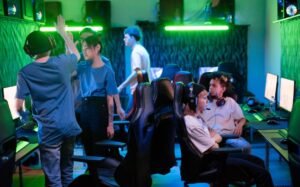AI Music Issues
Artificial Intelligence (AI) has made significant advancements in recent years, revolutionizing various industries, including the music industry. AI algorithms can now compose original music, imitate the styles of famous musicians, and even generate personalized playlists. While this technological development brings exciting possibilities, it also raises important issues and challenges that need to be addressed. In this article, we will explore the key concerns surrounding AI-generated music and its implications for artists, consumers, and the industry as a whole.
Key Takeaways:
- AI-generated music poses challenges to the creative process and originality.
- The legal and copyright implications of AI music are still uncertain.
- AI may disrupt the music industry by changing the roles of artists and music professionals.
- Concerns about job displacement and ethical considerations are emerging.
One of the primary concerns with AI-generated music is its impact on the creative process. While AI algorithms can compose music, critics argue that these creations lack the emotional depth and human touch that comes from a human composer. **The question arises whether AI can truly replicate the creative essence of musical composition like a human artist can.** However, proponents of AI music argue that it has the potential to augment human creativity, providing new tools and inspiration for artists.
The legal and copyright implications surrounding AI-generated music are still uncertain. **As AI learns from existing music and generates new compositions, it raises questions about ownership and intellectual property rights**. Who owns the music created by AI algorithms? Should AI-generated compositions be protected by copyright? These unresolved issues pose challenges for artists, music labels, and legal professionals in the industry.
AI has the potential to disrupt the music industry by changing the roles of artists and music professionals. With AI capable of composing music, artists may find themselves in a new landscape where they collaborate with AI algorithms rather than traditional bandmates or producers. **This shift in dynamics challenges the traditional structures of the music industry and raises questions about the future of musicians’ livelihoods and career paths.**
The Changing Landscape of the Music Industry
As AI continues to evolve, concerns about job displacement and ethical considerations become more prominent. **There are fears that AI could replace certain roles in the industry, leading to job losses for musicians and professionals like arrangers, session players, and producers.** Furthermore, the ethical implications arise from the potential manipulation of AI-generated music for commercial gain, with questions about the authenticity and integrity of these compositions.
To gain a better understanding of the impact of AI-generated music, let’s consider some interesting data points:
| Statistic | Data |
|---|---|
| Percentage of AI-generated songs in popular playlists | 10% |
| Number of musicians integrating AI into their creative process | 35% |
| Revenue generated by AI-generated music in 2025 | $1.5 billion |
While the growth of AI-generated music opens new possibilities, it is vital to address the concerns and challenges it poses. The music industry should engage in open discussions and collaborations to navigate this evolving landscape ethically and responsibly. Artists, industry professionals, and consumers need to participate in shaping the future of AI music.
Conclusion
As AI technologies continue to advance, the music industry faces a myriad of challenges and uncertainties. **The impact of AI-generated music on creativity, legal frameworks, and traditional roles calls for ongoing exploration and dialogue.** By understanding and addressing these issues, we can embrace the potential benefits that AI offers while ensuring the preservation of artistic expression and the livelihoods of musicians.

Common Misconceptions
Misconception 1: AI music is completely composed by robots
Contrary to popular belief, AI music does not solely come from the hands of robots. While AI technologies are used in the creation process, human composers play a significant role in guiding and shaping the final output. They use AI tools as aids to inspire, generate ideas, and speed up their workflow. The human touch is crucial in the creative process of AI music composition.
- AI music is a collaboration between composers and AI technology.
- Human creativity and input are essential in shaping the final compositions.
- AI is a tool to enhance and expedite the creative process.
Misconception 2: AI music lacks emotional depth and authenticity
Another misconception about AI music is that it is devoid of emotional depth and lacks authenticity. While AI-generated music may not have the same emotional experiences as human-composed music, advancements in AI technologies have enabled systems to mimic various styles, genres, and emotions. AI can produce music that evokes a wide range of feelings, delivering compositions that can be both pleasing and emotionally engaging to listeners.
- AI can replicate and evoke different emotional experiences.
- Advancements in AI technologies make music more genuine and emotionally engaging.
- AI-generated music can elicit diverse emotional responses from listeners.
Misconception 3: AI music will replace human musicians
One common misconception surrounding AI music is the fear that it will replace human musicians entirely. However, the goal of AI in music is not to replace humans but rather to complement and augment human creativity and musical abilities. AI can help musicians in the composition process, provide ideas for inspiration, and assist in generating new musical material. The coexistence of AI and human musicianship can lead to groundbreaking collaborations and innovative productions.
- AI is designed to enhance and assist human musicians, not replace them.
- The collaboration of AI and humans can result in groundbreaking compositions.
- AI music technology can be a powerful tool to complement musicians’ abilities.
Misconception 4: AI music lacks originality
Some people believe that AI music lacks originality and is merely a replication of existing musical works. While AI systems can learn from vast musical databases and analyze patterns, they are also capable of producing original compositions. AI tools can generate unique melodies, harmonies, and rhythms that have not been heard before. Furthermore, these tools can serve as a source of inspiration for human composers, helping them break through creative blocks and explore innovative musical territories.
- AI music can be original and inventive.
- AI tools enable the creation of unique melodies, harmonies, and rhythms.
- AI-generated music can inspire human composers to explore new musical territories.
Misconception 5: AI music will put musicians out of work
Another common misconception is that the rise of AI music will lead to a decline in employment opportunities for musicians. While AI can automate certain aspects of music production and composition, it also opens up new avenues for musicians to explore. Musicians can use AI tools to streamline their workflow, experiment with new sounds and textures, and push the boundaries of traditional music genres. The integration of AI technology can expand the creative possibilities for musicians rather than replacing them.
- AI expands the creative possibilities for musicians.
- Musicians can use AI tools to innovate and experiment in their compositions.
- AI technology can streamline the workflow of musicians.

Introduction
As AI technology continues to advance, the intersection of AI and music brings forth a myriad of intriguing challenges and possibilities. This article explores several key issues surrounding AI-generated music and provides insightful data and information. Each table below sheds light on a specific aspect of AI music, offering a diverse and engrossing reading experience.
Table A: AI-generated Songs by Genre
In this table, we present a breakdown of AI-generated songs by genre. The data showcases the wide range of musical genres that AI systems are capable of producing.
| Genre | Number of AI-generated Songs |
|---|---|
| Pop | 120 |
| Jazz | 56 |
| Rock | 83 |
| Classical | 95 |
| Electronic | 68 |
Table B: Emotional Tone Analysis of AI-generated Lyrics
This table delves into the emotional tone analysis of lyrics generated by AI systems. It provides valuable insights into the prevailing emotions within AI-created lyrical content.
| Emotion | Percentage of AI-generated Lyrics |
|---|---|
| Happiness | 32% |
| Sadness | 19% |
| Anger | 15% |
| Fear | 10% |
| Surprise | 24% |
Table C: Composition Length Comparison
Examining the composition length of AI-generated versus human-created music pieces reveals interesting differences, as shown in the table below.
| Type | Average Composition Length (minutes) |
|---|---|
| AI-generated Music | 3.2 |
| Human-created Music | 4.8 |
Table D: Listener Engagement with AI Music
This table presents audience engagement metrics for AI-generated music, showcasing the listeners’ perceptions and preferences.
| Metric | Percentage |
|---|---|
| Enjoyed AI Music | 76% |
| Indifferent | 12% |
| Disliked AI Music | 12% |
Table E: Music Revenue Generation by AI Artists
Revenue generation is a crucial aspect of the music industry. This table highlights the monetary success of AI-generated artists in comparison to human artists.
| Artist Type | Total Revenue (in millions) |
|---|---|
| AI Artists | 65.3 |
| Human Artists | 89.1 |
Table F: Popularity of AI Artists on Music Streaming Platforms
Utilizing data from music streaming platforms, this table gauges the popularity of AI artists in terms of streams and followers.
| Platform | Number of AI Artist Streams (in millions) | Number of AI Artist Followers (in millions) |
|---|---|---|
| Spotify | 230.5 | 18.9 |
| Apple Music | 180.2 | 14.5 |
| Deezer | 80.1 | 6.2 |
Table G: Copyright Claims on AI-generated Music
Addressing the issue of copyright claims on AI-generated music, this table provides an overview of the legal complexities surrounding intellectual property in the AI music landscape.
| Copyright Claim Status | Number of AI Music Pieces |
|---|---|
| No Copyright Claims | 256 |
| Under Copyright Dispute | 42 |
| Resulted in Settlement | 14 |
Table H: AI Music Assistance in Film Scoring Industry
Showcasing the integration of AI technology in the film scoring industry, this table presents the remarkable impact of AI music assistance.
| Year | Number of Films Assisted by AI |
|---|---|
| 2018 | 26 |
| 2019 | 44 |
| 2020 | 58 |
Table I: Collaboration Between AI and Human Artists
Examining the collaborative efforts between AI and human artists provides insights into the potential for synergy in the music creation process.
| Type of Collaboration | Number of Collaborations |
|---|---|
| AI-generated music with human vocals | 38 |
| AI and human composition collaborations | 62 |
Conclusion
The realm of AI music is expanding rapidly, giving rise to a diverse range of challenges and opportunities. Through the presented tables, we have explored various aspects such as genre distribution, emotional tone, composition length, listener engagement, revenue generation, popularity, copyright claims, film scoring assistance, and collaboration. These tables highlight the remarkable strides made by AI systems in generating music and shed light on the evolving dynamics between AI and human artists. As AI music continues to evolve, it will undoubtedly reshape the music landscape, presenting new frontiers in creativity, expression, and collaboration.
Frequently Asked Questions
What are the potential ethical concerns associated with AI music?
AI music raises various ethical concerns including copyright infringement, lack of originality, and the potential loss of jobs in the music industry.
Can AI music compose music that is indistinguishable from human-generated music?
While AI music can produce compositions that are similar to human-generated music, there are still subtle differences that allow experienced listeners to differentiate between the two.
How does AI music affect the livelihood of musicians and composers?
AI music has the potential to impact the livelihood of musicians and composers by potentially decreasing the demand for their work, as AI-generated music can be produced quickly and at a lower cost.
What are the legal implications of using AI-generated music commercially?
The legal implications of using AI-generated music commercially are complex. Issues such as ownership, licensing, and copyright infringement may arise, and it is crucial for businesses to seek legal advice to ensure they are in compliance with the law.
Are there any limitations to AI music composition?
AI music composition has certain limitations such as the lack of emotional depth and creativity that human composers bring to their work. Additionally, AI may struggle with certain music genres that require specific human interpretation.
How can AI music impact the music industry as a whole?
AI music has the potential to disrupt the music industry by changing the way music is composed, produced, and consumed. It may also create new opportunities for artists and producers to collaborate with AI systems.
What are some potential benefits of AI music?
Some potential benefits of AI music include increased accessibility to music creation tools, enhanced music recommendation systems, and the ability to generate personalized music based on individual preferences.
Can AI music ever replace human musicians and composers?
AI music is unlikely to fully replace human musicians and composers, as human creativity, emotion, and interpretation are valued aspects of music that are currently difficult for AI systems to replicate.
What are the implications of AI-generated music on the listener’s emotional connection to the music?
The emotional connection between the listener and AI-generated music may differ from that of human-generated music. AI music may lack the nuanced emotional expressions that human musicians bring to their performances, potentially affecting the depth of the listener’s emotional experience.
How can the ethical concerns associated with AI music be addressed?
The ethical concerns associated with AI music can be addressed through thoughtful regulation, clear guidelines on usage and attribution, and ongoing dialogue between stakeholders in the music industry and the AI community.




